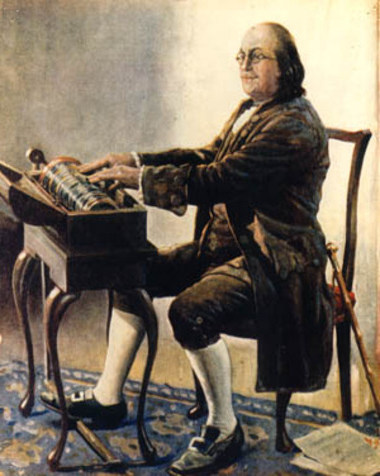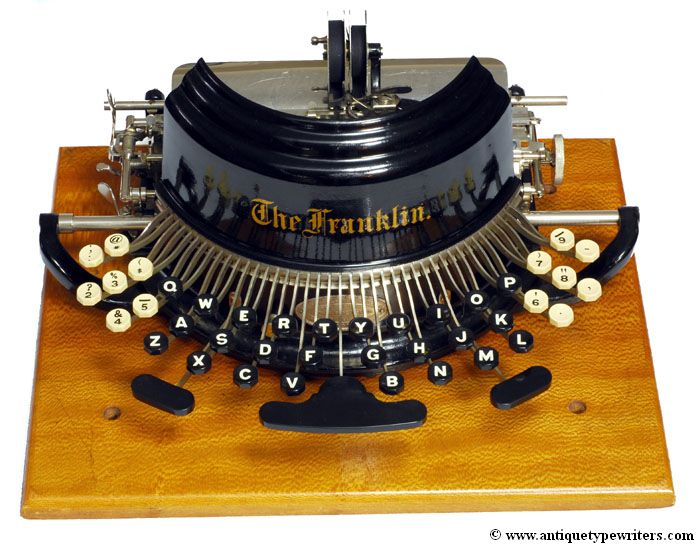
BENJAMIN FRANKLIN.
Two hundred years ago, Josiah Franklin left England for the shores of the new world, that he might worship God in a manner he thought right, but which he was forbidden to do in his native country.
Landing at Boston, he immediately set to work at boiling soap and making candles, in order to support his family, and in this business he remained until his death. The youngest but two of his seventeen children was named Benjamin, and was born in 1706. His father wished him to become a minister, but finding that he could not meet the expenses necessary for his education, he took him from school at the age of ten, and set him at cutting wicks, tending the shop, and running errands.
This work was not at all pleasant to the boy, who had while at school taken a great liking to books. One of his older brothers had run away to sea; and the father, seeing that his business was distasteful to Benjamin, and fearing he would follow his brother's example, resolved to put him at some trade with which he was better suited. Noticing his tendency for reading, he was led to think that the printing business would be better suited to his taste, and therefore placed him under the charge of another brother, who had set up an office in the city. He was to serve his new master nine years, or until he was twenty-one years of age; and so diligently did he apply himself to his new calling that he soon became a good workman, and was able to give his brother much valuable help. His passion for reading continued strong, and the greater part of many a night, after a hard day's work in the office, he spent poring over not story books which most at his age would have chosen, but books of travel, history, and others from which he gained much useful knowledge.
His taste for reading soon led him to try his hand at writing. When his father one day pointed out some faults in the composition of some of his letters, Benjamin resolved to cultivate a better use of language. It will perhaps be interesting to learn how a youth, faithfully serving his master at a trade, receiving no wages with which to buy books or hire instruction, and master of his own time only after the others had retired for the night, would set to work to acquire an excellence in the use of language. But his extensive reading had filled his mind with ideas, which he burned to give to the world, and he permitted no difficulty to prevent him from carrying out us purpose. He persuaded his brother to allow him one-half of the sum paid weekly for his board, with which to board himself. He then adopted a vegetarian diet, eating only vegetables and grains, purchasing his food and preparing his meals himself. In this way he saved one-half of the sum his brother allowed him, and with the money bought books. He made a practice of remaining at the office while the others were at dinner, and after swallowing his simple meal by himself, spent the rest of the noon in study. Of the effect of this course of diet he says: "I made the greater progress from that greater clearness of head and quickness of apprehension which generally attend temperance in eating and drinking."
Soon after resolving to acquire a better use of language, he obtained an odd volume of the Spectator, an English journal to which the best writers of that day contributed. He was so charmed with their language that he conceived the idea of making the paper his instructor and critic, which he did in the following manner: After carefully reading an article and noting down the different points which were discussed therein, he would, after a few days, compose a piece himself, from the hints he had committed to paper. After comparing his production with the original article, and thus discovering the faults in his composition, he would rewrite, and again compare with the Spectator. By this and numerous other self-imposed drills he made great improvement, not only in his writing, but also in his conversation. Soon after this, Franklin's brother started a newspaper, the second established in America. This brought many of the literary men of Boston to the office; and as Franklin heard them discuss the merits of the different articles in his brother's paper, he became desirous of receiving a share of their criticism. So he wrote out a paper in a disguised hand and slipped it under the door of the office, where it was found next morning, and submitted to the critics when they had assembled.
"They read it," he says, "commented upon it in my hearing; and I had the exquisite pleasure to find that it met with their approval; and that in the various conjectures they made respecting the author, no one was mentioned who did not enjoy a high reputation in the country for talent and genius." Thus encouraged, he slipped many a paper under the same door, the contents of which always found a place in the columns of his brother's paper.
It was not alone in his writing that Franklin manifested this application and industry, but it characterized his every undertaking, and enabled him to master by himself study after study, which others of his age acquired only in school. But Franklin did not receive from his master that treatment, which he thought his good services deserved, and when he remonstrated with him, received only blows in return. This he could illy brook from his own brother, and he finally became released from his apprenticeship, and found his way to Philadelphia, where he arrived, at the age of seventeen, unknown and almost penniless. Here he obtained employment at his trade, and by his application to his work and remarkable gift of invention, made his services very valuable. He soon gained much credit in the city for his studious habits and remarkable intelligence, and thereby obtained access to the libraries of gentlemen of wealth and influence, which not only increased his stock of knowledge but was the means of leading him into the best society.
At the age of twenty he laid down a set of rules to govern his future conduct, and these he closely observed throughout his life. The following are a list of the virtues, which he resolved to cultivate:
"Temperance; silence, or abstaining from frivolous talking; order; resolution, or determination to perform promises and duties; frugality; industry; sincerity, or the avoiding of all deceit; justice, or the wronging of no one; moderation; cleanliness; tranquility of mind; chastity; and humility."
In order to make the best use of his time, he rose at five every morning; divided the day into study and work hours; and devoted each evening to reading, or intercourse with friends on matters of profit. He also influenced many of the young people in the city to follow his example of self improvement, and in order to interest them in study and reading, he persuaded them to establish a public library, the first project of the kind started in America.
Seven years from the time he left Boston he found himself the proprietor of an office of his own, and the editor of a popular newspaper. From this time on, his reputation and usefulness steadily increased, and he began to reap the rewards of his self-denial and patient toil, not only in the accumulation of wealth, but in the love and respect of his countrymen. He had a remarkable insight into the wants of the people, and many were the projects, which he devised for their good. Among these may be mentioned the first association for extinguishing fires, and the first insurance company. He also made many useful discoveries in electricity while engaged in the study of chemistry and philosophy. The most noted of these was the discovery of the similarity between electricity and lightning, by which he was led to invent the lightning-rod; indeed, he did not rest satisfied with any discovery until he had turned it to some useful end in everyday life. In his paper he always espoused the cause of the people against the oppression of their rulers, and evinced such clear ideas of just laws and good government that after filling several prominent city offices, he was elected to the General Assembly of Pennsylvania.
While a member of that body, he gained great distinction as a statesman, and was often enabled by a single sentence or the recital of a story with a moral bearing on the point at issue, to defeat the arguments of the most eloquent orators. In so great esteem was his judgment held, that when differences arose between individuals or parties, he was often chosen arbitrator by both sides. For twenty-five years he published annually a little pamphlet called Poor Richard's Almanac, which contained numerous maxims and proverbs suited to the interests of businessmen, and written by Franklin. These maxims were so highly valued that they were afterward collected into a pamphlet, entitled, "The Way to Wealth," which was translated into various languages.
In some future number may appear some of these wise sayings. He also published an account of his wonderful discoveries, and by this means became known to the most eminent scientists throughout Europe. A gold medal was struck in his honor, degrees were conferred upon him by royal societies; and upon crossing the ocean, he was received with great respect by kings and their glittering courts, who considered him the greatest philosopher of the day.
His economical use of time when at home had enabled him to master many of the modern and dead languages, and his instructive conversation with these foreign rulers gave evidence of such intelligence and sagacity that they stood in veneration in his presence; and much credit did the American colonies gain through their loyal son. Yet through all this prosperity he preserved the same simplicity of dress and manner that characterized him when a printer in his native country.
It would be interesting to follow through the remainder of this great man's career as minutely as we have thus far done, but space forbids. Suffice it to say that after remaining for several years at the court of England, whither he was sent in the interests of the colonies, he returned to America in time to urge a declaration of independence; and his name, among others, appears signed to that courageous document. In 1778 he was sent as ambassador to the court of France, where by his diplomatic skill he secured the aid of that country in our war for independence. Returning again to America, be assisted in framing the Constitution of the United States. At Philadelphia, in 17 90, at the age of eighty-four, Franklin died, lamented by his fellowmen throughout the world.
CHAS. H. GILES.
